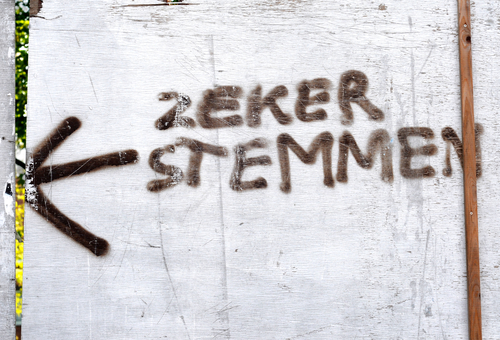The local elections are looming – and you may well be able to vote

Hundreds of thousands of foreign residents will be able to vote in the elections which take place on March 16 in almost all the Netherlands’ 362 local authority areas.
Voting is open to all EU nationals and anyone who has lived in the Netherlands for more than five years – as long as they are officially registered with their local authority.
Unlike during the European elections, when many people were unaware they had to register to vote and local councils failed to pass on the information, potential voters will be automatically sent a ballot paper.
‘Residents who meet the conditions will automatically be registered as voters,’ the voting council Kiesraad told DutchNews.nl. ‘They will automatically be sent a call-up card to take part in the elections.’
A spokeswoman for Amsterdam council, where 88,000 foreign residents were able to vote in the last local elections, said the city is not planning anything specific to encourage internationals to vote.
However, short films about the elections would be subtitled, the spokeswoman said.
A poll of DutchNews.nl readers in October showed that 45% would definitely or probably vote in the local elections, but that 18% did not know if they could or not. A further 8% said they were not interested in local politics.
Top of readers’ concerns was the shortage of affordable housing. Improving recycling facilities and garbage collection and tackling discrimination were also mentioned by more than a third of respondents.
Role
The main tasks of local councils include ensuring sufficient housing, building local roads, tunnels and cycle tracks, collecting and processing waste, providing schools and libraries, issuing documents like passports, dealing with welfare (bijstand) claims and ensuring proper long term residential and home care.
Some 90% of local council funding in the Netherlands comes from national government. Councils themselves raise money through local property taxes – based on property values – waste collection and water charges, parking fees and tourist taxes.
The number of councillors in a gemeenteraad depends on the size of the local authority area. Councils with a population of more than 200,000 residents have 45 members or councillors and the smallest, with fewer than 3,000 residents, just nine.
Mayor
Local councils are run by the mayor (who is appointed by the crown) and a team of wethouders, or aldermen. The college van burgemeester en wethouders (B&W) is the local authority equivalent of the cabinet.
The cut-off date for taking part is January 31, which means everyone listed in the official council register BRP by then will be included. Voters will be sent their ballot papers at least 14 days before the election takes place.
As with the general election last year, polling stations will also open on March 14 and 15 to allow people who want to avoid large groups sufficient time to vote.
Thank you for donating to DutchNews.nl.
We could not provide the Dutch News service, and keep it free of charge, without the generous support of our readers. Your donations allow us to report on issues you tell us matter, and provide you with a summary of the most important Dutch news each day.
Make a donation